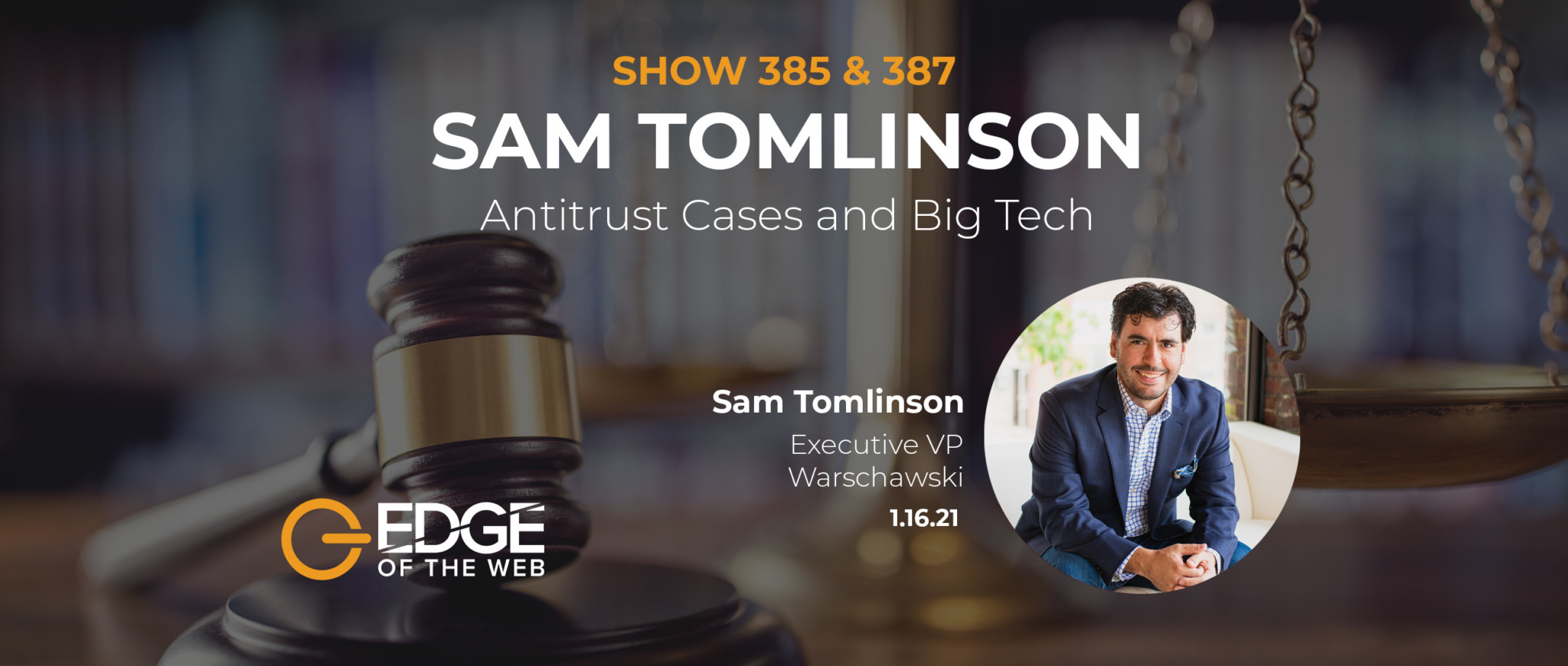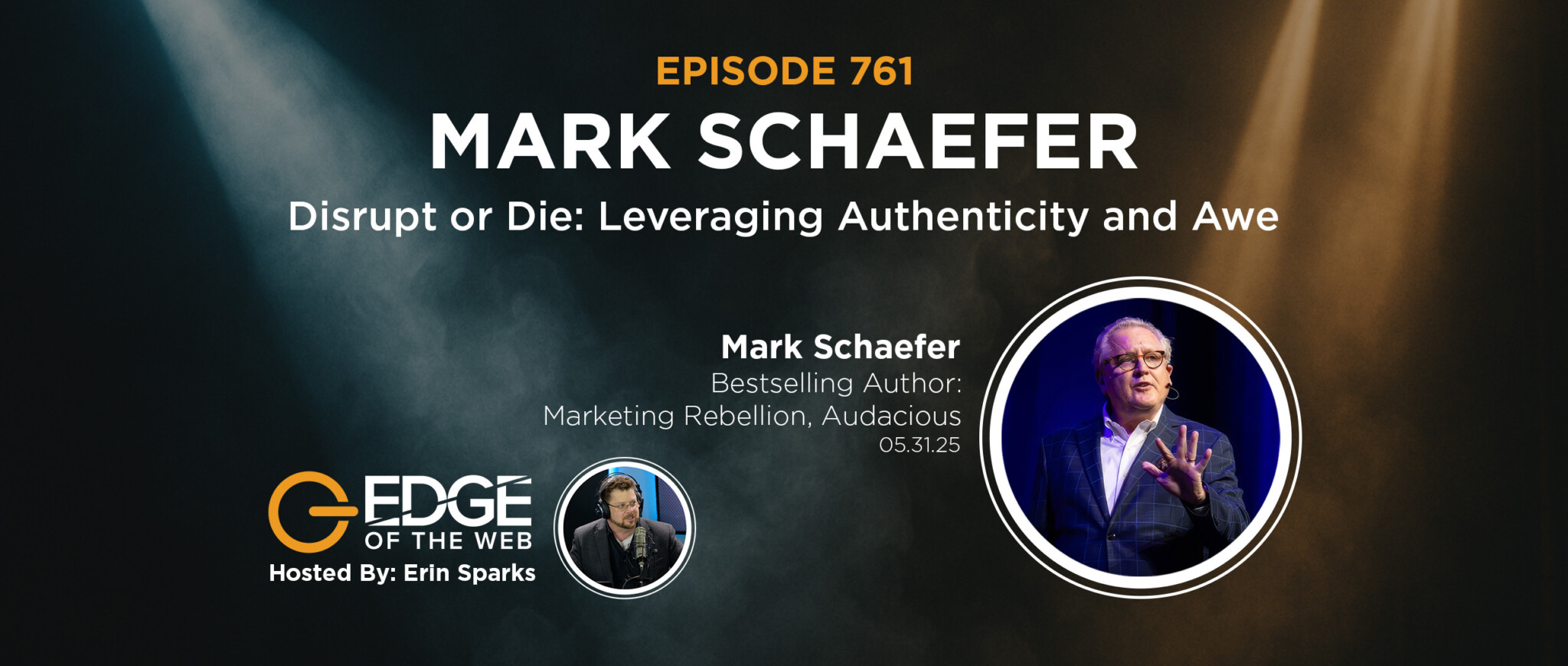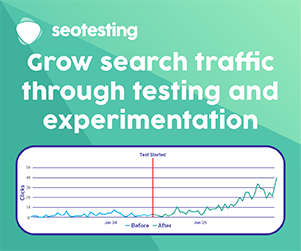In the second part of an interview with was Sam Tomlinson, Executive Vice President at Warschawski, host Erin Sparks spoke with Sam about some of the specifics of emerging anti-trust actions against big-tech companies, and what the impacts might be for digital marketers. Here’s what we learned in episode 387 of the award-winning EDGE of the Web podcast:
Why the “Break “Em Up” Approach is Wrong
Sam notes that there doesn’t seem to be any point to simply breaking up a tech giant like Google. Just because you force YouTube to split off from Google to be its own standalone company doesn’t mean anyone is going to stop using YouTube, nor is it going to make it any easier for similar companies to gain a foothold in market share because the network effect has already taken place, nor would a standalone YouTube create its own search engine to compete against Google Search, once again because a standalone Google Search company has already experienced the network effect of everyone using it for search.
So, there doesn’t seem to be any point in just taking a hammer to these companies to break them up. It’s not clear that anything would be gained by it. But it is shocking when you look at the Big Four (Google, Apple, Amazon, and Facebook) to see how them in recent years they’ve outright purchased something like 800 other companies. And many of those companies had themselves previously acquired many companies, so in the total “food chain” of companies the Big Four have actually gobbled up thousands of other companies. But part of what’s happening in these acquisitions is that the bigger acquiring company has more capital to put into innovation and that constant innovation is what is good for users, at least a lot of the time.
Anti-Trust Action Against Facebook
But in the midst of all this there is still the primary concern of anti-trust laws which are meant to stay mindful of some moral principles in doing good business.
On December 9, 2020, the FTC (Federal Trade Commission) sued Facebook for illegal monopolization. According to the FTC’s complaint, Facebook is the world’s dominant personal social networking service and has monopoly power in that market. Facebook targeted potential competitive threats to its dominance such as Instagram. Facebook initially tried to compete with Instagram on the merits by improving its own offerings, but Facebook ultimately chose to buy Instagram rather than compete with it. Facebook’s acquisition of Instagram for $1 billion in April 2012 allegedly both neutralizes the direct threat posed by Instagram and makes it more difficult for another personal social networking competitor to gain scale. Same thing with WhatsApp when it emerged as the clear global “category leader” in mobile messaging. Again, according to the complaint, Facebook chose to buy an emerging threat rather than compete and announced an agreement in February 2014 to acquire WhatsApp for $19 billion.
Sam notes, however, that both of these deals were reviewed and signed off on by the Federal Trade Commission when they were happening. Why is it now suddenly a problem when they approved it to begin with? And every elementary school kid who trades a baseball card knows it’s final, there are no “take-backs,” so for the FTC to now be doing this feels like a kind of “take-back.”
Sam also pushes back against the idea that no other company can compete. Just look at TikTok, which amassed over a billion users in an unbelievably short amount of time. Look at Snapchat and how well it’s doing. It’s wrong to say no other company can compete. And that’s about user demographics, right? Facebook skews older. Today’s teens don’t use Facebook, and many don’t use Instagram—they use TikTok and Snapchat!
There’s also the issue around third-party apps where Facebook allegedly has made key APIs available to third-party applications only on the condition that they refrain from developing competing functionalities, and from connecting with or promoting other social networking services. When a dominant company does that, it feels like an anti-competition kind of move.
Sam thinks this predatory conduct around app developers is an issue, but it’s one that is easily solved with regulation in the same way other industries are regulated (the banking industry comes to mind), we just have to do it. And again, this gets back to what everyone is missing, which is be clear about what the problem is you think needs to be addressed. Everyone involved is upset, but there’s no clarity on what the real problems are.
Anti-Trust Action Against Google
The problem here is when a company controls every part of the digital advertising pipeline and gives priority to its own services, there’s a problem. As the New York Times put it, Google gets to be the “pitcher, batter and umpire, all at the same time,” and it just doesn’t feel right.
In October 2020, the US Department of Justice filed a landmark lawsuit alleging that Google unlawfully boxed out competitors by reaching deals with phone makers, including Apple and Samsung, to be the default search engine on their devices. The latest lawsuit, filed by nearly 40 attorneys general on Dec. 17, 2020, alleges that the tech giant’s search results favored its own services over those of more specialized rivals, a tactic that harmed competitors.
The complaint came after 10 other states led by Texas accused Google of engaging in “false, deceptive, or misleading acts” while operating its buy-and-sell auction system for digital ads. Google has been accused of hurting competitors by giving priority in its search results to its own products, like shopping ads or local business listings, over the listings of rivals.
Sam started with the Texas lawsuit that has to do with the whole ad-tech stack because it’s probably the strongest case of any of them because they’ve produced really solid documentation of how Google dominates the whole ad tech stack and operates its pieces in a way to exclude competitors and to self-preference. What’s good is to see regulators getting to really unpack the digital ad stack and understand it. Where it goes off the rails is when people try parallel it with the financial industry regulations. But simply put, those regulations do not apply to digital advertising and a choice was made early on not to regulate much of big-tech, so you can’t use that tack unless you make regulations specifically for this industry. But the self-preference issue is real and can be dealt with by regulation.
When it comes to Google Search, SEOs get all upset when Google makes changes to its core algorithm that affects their search rankings, as if Google somehow doesn’t have a right to do that. But they do! It’s their platform and if you don’t like it, there are in fact other ways to build and market your business. And everyone’s in the same boat when it comes to what Google does.
Another issue is Google outcompeting “various search” platforms. The hard truth is that most vertical search engines have sucked. No likes using TripAdvisor, no one likes going to Booking.com, and no one likes Yelp. If you’re going to cry about your ranking going down, build a better platform! Google is very clear about what it wants to see in user experience and quality content, and they provide a lot of tools to help you see and create what’s going to align their quality guidelines. If your site provides a bad user experience, it’s going to get downranked because it’s Google’s reputation and mission at stake to have top results be excellent, reliable, trustworthy, high-quality pages and sites.
Google comes along and just does the vertical search better. Google Reviews are way better than Yelp reviews. Google Flights is so much better than any flight vertical search. So this is what Google does—it gains an understanding of what best serves the user and then creates a better product to do that. It’s what Sears used to do. It’s what Walmart does. It’s just business. And when Google comes along and does something better, then it forces innovation for people to find something else, and that’s good. What Google does is aimed at being good for the consumer, but some of their tactics in getting there might be questionable. If they violate ethics in the process, then deal with that, but otherwise, let them run their business to serve consumers.
It’s always going to be complex, and there are trade-offs that have to be figured out. In the final analysis, the big-tech companies aren’t really doing anything businesses haven’t been doing for decades, they’re just doing it at such a massive scale that it’s making people nervous, and there are some real issues to address.
Connect with Sam Tomlinson and Warschawski
Twitter: @DigitalSamIAm (https://twitter.com/DigitalSamIAm)
Sam’s Website: https://samtomlinson.me
Warschawski Twitter: @thewagency (https://twitter.com/thewagency)
Warschawski Facebook: @thewagency (https://www.facebook.com/thewagency)
Warschawski LinkedIn: https://www.linkedin.com/company/warschawski
Warschawski Website: https://www.warschawski.com
Connect with Erin Sparks, Host of EDGE of the Web and CEO of Site Strategics
Twitter: @ErinSparks (https://twitter.com/erinsparks)
LinkedIn: https://www.linkedin.com/in/erinsparks/






















